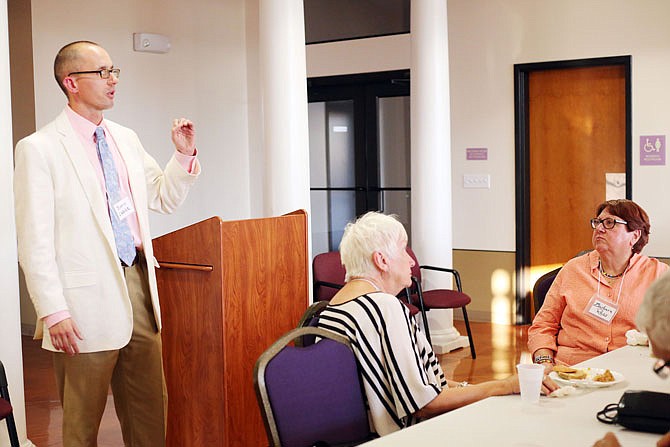A discussion of jury selection in Cole County, during Thursday night's Empower Missouri annual dinner meeting, evolved into a more wide-ranging, nearly 90-minute discussion of prosecutors and the state's criminal justice system.
The main speakers were local Public Defender Justin Carver and NAACP President Rod Chapel.
Carver noted he came to the Jefferson City office nearly three years ago, after working 12 years in other Mid-Missouri counties, and he noticed a pattern in the selection of juries in Cole County that, he thought, "isn't right. It's not supposed to work this way."
That included "an under-representation" of African Americans in the jury pools, when "the census data tells us the African American population (is) about 11.2 percent."
That means, on average, each pool of 150 jurors in Cole County should have "15, 16 African Americans," Carver said.
But he said the jury pools he encountered consistently had fewer numbers, including one pool with no African Americans.
Then, in jury selection for individual trials, Carver said he and his assistant public defenders determined Prosecutor Mark Richardson and his staff were cutting African Americans from serving as jurors without a valid reason.
Carver noted the state appeals court in Kansas City agreed June 27 the prosecution had cut one juror in Lawrence Mosely's marijuana distribution case because of her race, violating a 1986 U.S. Supreme Court ruling that race can't be a factor in deciding who serves on a jury.
After the jury convicted him, Cole County Circuit Judge Dan Green sentenced Mosely to 12 years on each of the two counts to be served at the same time, but the appeals court canceled the convictions and sentence. Mosely now faces a new trial in late-October.
"Of all the places I've been, I haven't seen anything (like) this, other than in Cole County," Carver said.
Richardson generally doesn't comment on pending cases, and he couldn't be reached late Thursday for comment.
Carver said he can't recall the issue occurring in any case where his client was white, but it has occurred often when the client was African American and, in one case, Native American.
Carter told Thursday's meeting he's asked the Kansas City appeals court to review several other cases that have similar issues of a potential juror's removal - and still is waiting to see if he gets similar rulings.
But even if he wins those other appeals, Carver said, "From my perspective, there are a number of problems that arise when this happens," including his clients' feeling "that the system is rigged, that the trial is unfair.
"It seems to me that, if we want people to respect the court system, they have to feel the process is fair - (or) they won't have any respect for the final outcome - even if the final outcome was otherwise fair."
Carver said he only could talk about what he sees in the courtroom - but wondered what part race plays in prosecutors' decisions about filing charges or offering plea deals versus trials.
He also said poverty plays a role, since poor people are more likely to remain in jail until their trial happens in months or years - and are more likely to agree to a plea deal, even if they're not guilty.
Chapel said he'd experienced similar issues in his work as a trial lawyer, and he pointed to last year's "Medicaid 23" trial where Richardson prosecuted a group of pastors "for praying in a public place."
Although one of the 23 still faces a trial, the others were convicted of one count of misdemeanor trespassing in the state Senate in May 2014.
All but six later were pardoned by then-Gov. Jay Nixon.
In May, Green sentenced the six who didn't accept the pardons to one year of unsupervised probation.
But during last year's trial, Chapel said, several potential jurors were dismissed because they knew one or more of the defendants, while at least one juror was allowed to remain even though that person had worked on Richardson's political campaign and knew one of the law enforcement witnesses.
"There's a prosecutor (here) in Cole County who is not working in line with the morals of this community," Chapel said.
Allowing that to continue means "we are criminalizing society," he added, noting "there are good prosecutors and bad prosecutors," and people have to demand their prosecuting attorneys be more fair in the decisions they make.
Chapel said his comments were "not anti-anybody," but he echoed Carver's comment "there's a deep concern that the people no longer believe in the criminal justice system."

